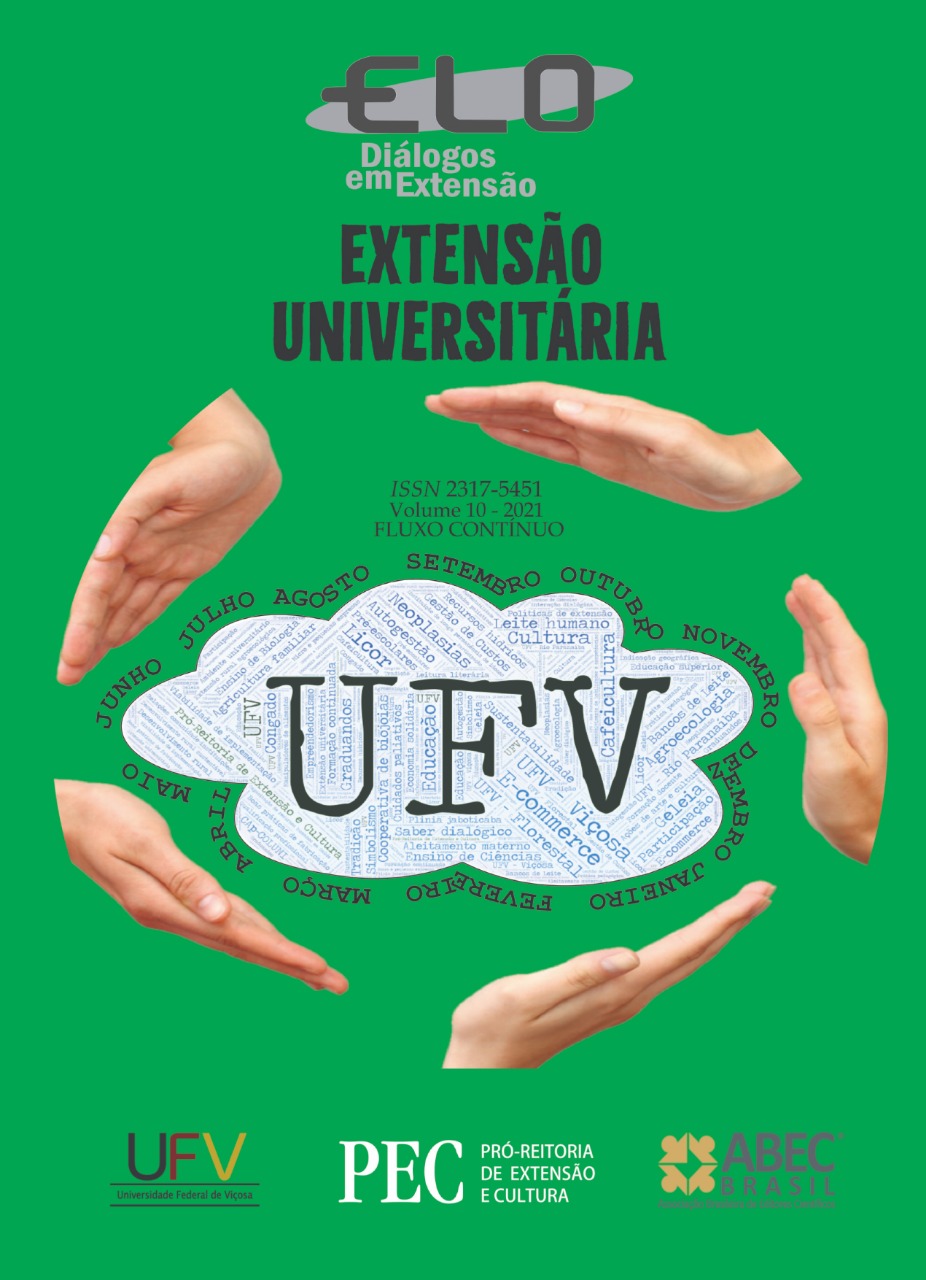A educação ambiental em curso formativo: uma proposta para a formação de jovens do ensino médio por meio das artes
DOI:
https://doi.org/10.21284/elo.v10i.11373Palavras-chave:
Educação Ambiental, Práticas artísticas, Resíduos sólidos urbanosResumo
Resumo: Considerando as macrotendências que se referem aos segmentos da Educação Ambiental, o presente trabalho teve como objetivo desenvolver ações que mitigassem os problemas ambientais. Para o alcance deste objetivo foram utilizadas práticas artísticas e ambientais visando o ensino de Educação Ambiental aos jovens do Ensino médio. Durante um curso, foram desenvolvidas atividades compostas por práticas a campo estruturadas em conceitos agroflorestais, resíduos sólidos urbanos mediadas por atividades artísticas, com animações e desenhos de observação (mapeamento ambiental). Os resultados mostraram que abordagens artísticas e práticas ambientais ajudam a promover um processo de sensibilização ambiental por serem integrativas com o meio ambiente, para tanto os cursistas realizaram apontamentos ilustrativos sobre problemas ambientais tendo como destaque resíduos de sólidos urbanos, posteriormente sugeriram a implantação de uma horta em uma área abandonada dentro da Universidade, estes processos contribuíram para que aos alunos adquirissem uma visão consciente dos recursos naturais e preservação do meio ambiente.
Palavras-Chaves: Educação ambiental. Práticas artísticas. Resíduos sólidos urbanos.
Área Temática: Educação Ambiental
Downloads
Referências
BARRETO, V.P. A Educação Ambiental como proposta reflexiva da realidade. Centros de estudos gerais aplicados. Monografia do Curso de Pedagogia. Universidade Federal Fluminense. Niterói, 2006.
BORDIN, J. H. Educação revessa. Pelotas, RGS: Editora Universitária/UFPEL, 2010.
BRASIL, Ministério do Meio Ambiente. Política Nacional de Educação Ambiental - Lei nº 9795/1999, Art 5º inciso I. Acesso em: 13 Mai 2019. Disponível em: http://www.mma.gov.br/educacao-ambiental/politica-de-educacao-ambiental
CUNHA, V. T. et al. Horta na escola: uma forma didática de trabalhar a sustentabilidade. Revista Ibero-americana de Ciências Ambientais, Aquidabã, v. 5, n. 2, p. 38-48, 2014. Disponível em: <https://doi.org/10.6008/SPC2179-6858.2014.002.0004>. Acesso em: 24 abr. 2018.
DIAS, M. Educação Ambiental: princípios e práticas. São Paulo: Gaia, 2004.
GUIMARÃES, M. Educação ambiental crítica. In: LAYRARGUES, P.P. (coord.). Identidades da educação ambiental brasileira. Brasília; Ministério do meio Ambiente, 2004.
JACOBI, P. R.; TRISTÃO, Martha; FRANCO, Maria Isabel Gonçalves Correa. A função social da educação ambiental nas práticas colaborativas: participação e engajamento. CAD. SEDES, Campinas, vol. 29, n. 77, p.63-79, jan./abr. 2009. Disponível em < HTTP:// www.Cedes.unicamp.br > acesso em: 12 março.2020
KREMER, J. Caminhando rumo ao consumo sustentável: uma investigação sobre a teoria declarada e as práticas das empresas no Brasil e no Reino Unido. PPG em Ciências Sociais. PUCSP, São Paulo, 2007. 323 p.
SORRENTINO, M.; TRAIBER, R.; MENDONÇA, P.; JUNIOR, L.A.F. Educação ambiental como política pública, 2005.
LEWIN, K. Problemas de dinâmica de grupo. São Paulo: Cultrix, 1978.
LOUREIRO, C.F.B. Educação Ambiental transformadora. In: LAYRARGUES, P. P. (Org.). Identidades da educação ambiental brasileira. Brasília: MMA/DEA,2004.
LOUREIRO, C.F.; TREIN, E.; TOZONI-REIS, M.F.; NOVICKI, V. Contribuições da teoria marxista para a Educação Ambiental crítica. Cad. Campinas, CEDES, vol.29, n.77, jan./abr. 2009. p. 81-97.
LOUREIRO, C.F.; TREIN, E. Educação Ambiental e “Teorias críticas”. In: GUIMARÃES, M (Org.). Caminhos da educação ambiental. Campinas: Papirus, 2006.
MALTEZ, H. M.; PENEIREIRO, F.M. Jardins Agroflorestais (Texto base para a Oficina “Jardins Agroflorestais” Conferência Internacional Infanto-Juvenil - Vamos Cuidar do Planeta), Brasília: 2010.
MARQUES, J. S. As imagens do desenho: percepção espacial e representação. (Trabalho de Síntese) Faculdade de Belas Artes do Porto, 2006.
MELLO, L.E.; SOARES, M.H.F.B. Atividades lúdicas no desenvolvimento da Educação Ambiental. II SEAT – Simpósio de Educação Ambiental e Transdisciplinaridade UFG / IESA / NUPEAT - Goiânia, maio de 2011.
MARCONI, M. A., LAKATOS, E. M. Metodologia Científica. 5. ed. 2. reimpr. São Paulo: Atlas, 2008.
MOUSINHO, P. Glossário. In: Trigueiro, A. (Coord.) Meio ambiente no século 21. Rio de Janeiro: Sextante. 2003.
SANTOS, S. M. P. dos. O lúdico na formação do educador. 5 ed. Vozes Petrópolis, 2002.
OLIVEIRA, L. L.; LACERDA, C. S.; ALVES, J.B.R.; SANTOS, E.D.; OLIVEIRA, S.A.; BATISTA, T. S. A. Impactos ambientais causados pelas sacolas plásticas: o caso Campina Grande – PB. BioFar, 2012.
PIMENTEL, A. K. S.; ARAUJO, K. K. S.; ROCHA, M. V. R. Coleta seletiva em uma empresa de lim¬peza pública de Maceió (AL). Maceió, 2011.
POLETTO, R. S.; OLIVEIRA, R. A. G.; MACHADO, T. A.; FRANCO, D. M. Implantação de Sistema Agroflorestal na Agricultura Familiar. Cornélio Procópio-PR: Edição do Autor, 2018, 19p.
RIBEIRO, J. W.; ROOKE, J. M. S. Saneamento básico e sua relação com o meio ambiente e a saúde pública. Juiz de Fora, MG. 2010.
THIOLLENT, M. Metodologia da pesquisa-ação. São Paulo: Cortez, 2000.
XAVIER, L. H.; CARDOSO, R.; MATOS, R. M. Legislação ambiental sobre destinação de resíduos sólidos: o caso das embalagens plásticas pós-consumo. XIII SIMPEP - Bauru, SP, Brasil, 6 a 8 de novembro de 2006.
ZABALA, A. A prática educativa: como ensinar. Porto Alegre: Artes Médicas, 1998.
Downloads
Publicado
Como Citar
Edição
Seção
Licença
Copyright (c) 2021 Revista ELO – Diálogos em Extensão

Este trabalho está licenciado sob uma licença Creative Commons Attribution 4.0 International License.
Autores que publicam nesta revista concordam com os seguintes termos:
- Autores concedem à revista o direito de primeira publicação, com o trabalho simultaneamente licenciado sob a Creative Commons Attribution License que permite o compartilhamento do trabalho com reconhecimento da autoria e publicação inicial nesta revista.
- Autores têm autorização para assumir contratos adicionais separadamente, para distribuição não-exclusiva da versão do trabalho publicada nesta revista (ex.: publicar em repositório institucional ou como capítulo de livro), com reconhecimento de autoria e publicação inicial nesta revista.
- A Revista reserva-se o direito de efetuar alterações nos originais de ordem normativa, ortográfica e gramatical, com vistas a manter o padrão culto da língua, respeitando, porém, o estilo dos autores.
- As opiniões emitidas pelos autores são de sua exclusiva responsabilidade.

















